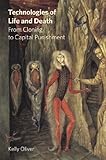Technologies of Life and Death : From Cloning to Capital Punishment / Kelly Oliver.
Material type: TextPublisher: New York, NY : Fordham University Press, [2013]Copyright date: ©2013Description: 1 online resource (272 p.)Content type:
TextPublisher: New York, NY : Fordham University Press, [2013]Copyright date: ©2013Description: 1 online resource (272 p.)Content type: - 9780823251087
- 9780823252268
- 174.2 23
- QH332 .O45 2013eb
- online - DeGruyter
| Item type | Current library | Call number | URL | Status | Notes | Barcode | |
|---|---|---|---|---|---|---|---|
 eBook
eBook
|
Biblioteca "Angelicum" Pont. Univ. S.Tommaso d'Aquino Nuvola online | online - DeGruyter (Browse shelf(Opens below)) | Online access | Not for loan (Accesso limitato) | Accesso per gli utenti autorizzati / Access for authorized users | (dgr)9780823252268 |
Browsing Biblioteca "Angelicum" Pont. Univ. S.Tommaso d'Aquino shelves, Shelving location: Nuvola online Close shelf browser (Hides shelf browser)

|

|

|

|

|

|

|
||
| online - DeGruyter Motherhood as Metaphor : Engendering Interreligious Dialogue / | online - DeGruyter Sovereignty and Its Other : Toward the Dejustification of Violence / | online - DeGruyter Speculative Grace : Bruno Latour and Object-Oriented Theology / | online - DeGruyter Technologies of Life and Death : From Cloning to Capital Punishment / | online - DeGruyter Alexandrian Cosmopolitanism : An Archive / | online - DeGruyter The Human Eros : Eco-ontology and the Aesthetics of Existence / | online - DeGruyter The Pleasure in Drawing / |
Frontmatter -- Contents -- Acknowledgments -- Introduction: Moral Machines and Political Animals -- Part One. Sex Machines -- One. Genetic Engineering: Deconstructing Grown versus Made -- Two. Artificial Insemination: Deconstructing Choice versus Chance -- Part Two. Medusa Machines -- Three. Girl Powered: Poetic Majesty against Sovereign Majesty -- Four. Rearview Mirror: Art, Violence, and Sublimation -- Five. Elephant Autopsy: Optic Machinery and the Scale of Sovereignty -- Six. Deadly Devices: Animals, Capital Punishment, and the Scope of Sovereignty -- Seven. Death Penalties: Ethics, Politics, and the Unconscious of Sovereignty -- Notes -- Bibliography -- Index
restricted access online access with authorization star
http://purl.org/coar/access_right/c_16ec
The central aim of this book is to approach contemporary problems raised by technologies of life and death as ethical issues that call for a more nuanced approach than mainstream philosophy can provide. To do so, it draws on the recently published seminars of Jacques Derrida to analyze the extremes of birth and dying insofar as they are mediated by technologies of life and death. With an eye to reproductive technologies, it shows how a deconstructive approach can change the very terms of contemporary debates over technologies of life and death, from cloning to surrogate motherhood to capital punishment, particularly insofar as most current discussions assume some notion of a liberal individual.The ethical stakes in these debates are never far from political concerns such as enfranchisement, citizenship, oppression, racism, sexism, and the public policies that normalize them. Technologies of Life and Death thus provides pointers for rethinking dominant philosophical and popular assumptions about nature and nurture,chance and necessity, masculine and feminine, human and animal, and what it means to be a mother or a father. In part, the book seeks to disarticulate a tension between ethics and politics that runs through these issues in order to suggest a more ethical politics by turning the force of sovereign violence back against itself. In the end, it proposes that deconstructive ethics with a psychoanalytic supplement can provide a corrective for moral codes and political clichés that turn us into mere answering machines.
Mode of access: Internet via World Wide Web.
In English.
Description based on online resource; title from PDF title page (publisher's Web site, viewed 03. Jan 2023)


